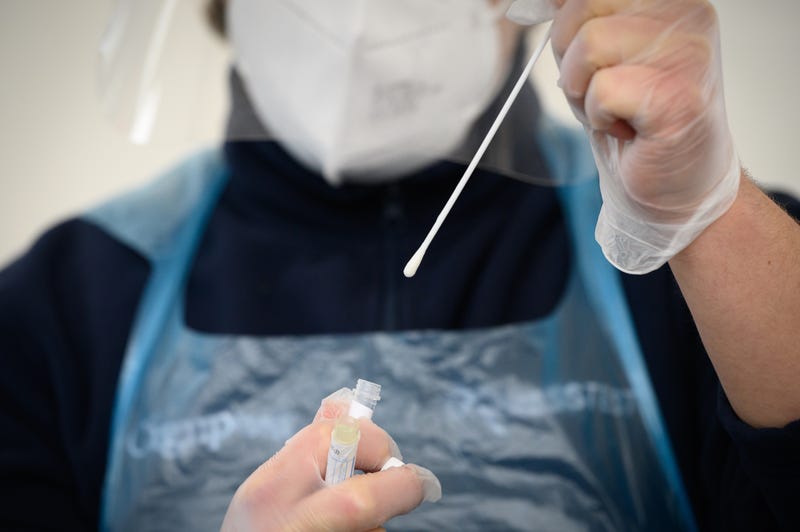
It was last Monday when the land border between the United States and Canada officially re-opened to fully vaccinated travelers.
However, the Canadian government continues to force travelers to receive a negative COVID-19 test within 72 hours of crossing the border.
A polymerase chain reaction (PCR) test the most common test people use when testing for COVID-19 or, in this case, try to get access to cross the border in Canada. In most cases, PCR test results can come back within 24-48 hours of the day someone tested.

However, people are lately receiving a significant delay in getting back their test results, which has affected the way some do cross-border business.
Sharon is the director of regional sales and director of cross-border sales for her company, with 80% of the clients she works with being Canadian. Now with the border re-opened, she has the ability to re-connect with her clientele after more than a year-and-a-half of being hampered due to the COVID-19 pandemic.
However, that process of re-connecting with some of her business partners has already hit a snag with the delays in receiving the necessary COVID-19 test results to cross the border.
"I had a test on Monday, planning ahead that I knew I had business appointments on the Canadian side of the border on Thursday," Sharon said, explained of her situation. "I get my test results back normally 36 hours, sometimes it pushes 48 hours, so it gives me Wednesday, Thursday as like a comfortable zone of being able to cross. I got my results back [on Friday] at 11:30 a.m. EST. Long story short, I had to cancel all my business appointments. It's been stressful, and this is something that should not be happening."
As Sharon is trying to get back across the border to re-connect with her business associates, she feels she has to jump through many different hoops just to try and do her job to get back on track with her clients. That experience is already proving to be quite challenging.
"We can't activate tourism when people have that uncertainty. Are they going to be able to get back into Canada?," Sharon said. "I canceled appointments, that's not a problem. But what if I had to go around the corner and take that COVID test to get back home that's going to cost me $225 [per-person]? It's horrible."
Rob is another another frequent traveler across the U.S. and Canadian border and does a lot of work with banks and governments. Him and his wife are own businesses in both countries, and they live in both countries.
Prior to the pandemic, Rob and his wife would cross border roughly once every two weeks by airplane. Now they resort to traveling by car across the border, but must get their negative PCR COVID-19 test before heading back into Canada.
While the timing of the PCR tests coming back have been inconsistent for Rob as well, he believes there is more to the requirements that are an issue.
"Fortunately, we can deal with the cost of it, but it's not something that everyone should have to do, and it's not fair," Rob said. "The thing with the COVID testing that I find a bit ridiculous is... We took our COVID test [Friday], and we have to wait approximately 30-40 hours before we get the results. In the meantime, you can go out and do whatever you want. What happens to that test result, to me, is pretty much invalid by the time you use it to cross the border.
"Say if I'm a Canadian resident and I want to go to a Buffalo Bills game. Right now, the Canadian government says I can get my PCR test done in Canada, get my results, then go to a Buffalo Bills game, drink and party with 70,000 of my closest friends at the game, and then I can use that test result that was pre-party from Canada and use that as my entry back into Canada and the government allows that. What was the point? Wouldn't they be more interested in what was the impact of me socializing with 70,000 people at a football game? But instead, they said that test I took prior to going to the football game was considered valid. To me, it's putting lipstick on a pig."
While Rob says he's been fortunate to be able to cross the border back-and-forth the whole time, he says the problem is there is a cost involved with the process. Not only with money, but with time.
"What they're trying to achieve - as far as minimizing the effects of the pandemic - they're totally missing that aspect. I don't think what they're doing is medically going to change anything," Rob said. "My wife and I have been double vaccinated since April of this year, we just received our boosters a couple of weeks ago. To me, if you're going to go back-and-forth across the border, [you should] be able to show you're totally vaccinated. But the way they're handling the PCR tests doesn't make sense whatsoever. It's not medically responsible, because by the time you get the results of the data, it's 48 hours old. It's useless by then."
So what could be the cause for the delays of people receiving their PCR tests later than usual?
Owner and pharmacist at Brighton Eggert Pharmacy, Don Arthur, says that while the technology has changed quite a bit with COVID-19 testing since the start of the pandemic, testing for some pharmacies has become more of a challenge than others.
"At our facility, we have two types of PCR tests. One, we do an analyzer that we have at our facility. We have the results back in 30 minutes, and based on our queue, we can provide those results within 1-2 hours to the individual's email. We also do a lab-based PCR with a local company called KSL [Diagnostics], and that's a currier we send that out and those results are 24 hours," Arthur said.
"Unfortunately, some of the other locations throughout Western New York, and I can't speak for them, they've had challenges getting the results out quicker. I know this, because a large percentage of those individuals coming to our facility are frustrated. They did find a location, they were able to get an appointment and the testing was free, but they need to travel when they approach us and the results were not provided to them. Again, I think some of the large national chains have partnered with companies that are out of town. I think the logistics are extremely difficult for a Walgreens, Rite Aid, CVS Pharmacy and pharmacists, who are extremely busy this time of year with cough/cold season, handling prescriptions. Now the chain pharmacies have been asked to immunize the community, which I think is great but it's additional responsibility. Now you throw testing on top of that, I think getting results quickly is a challenge for them."

While Arthur says appointments are his pharmacy are not required, he asks to anyone requiring a PCR test to schedule an appointment to make it easier for tests to be conducted, analyzed and distributed much more easily.
Movements have been made by many, including congressman Brian Higgins, for the Canadian government to end the policy for travelers into Canada to require a negative COVID-19 test before crossing the border. Many have said that being fully vaccinated should be enough proof that it is safe to travel cross-borders and conduct business as usual.
As for both Rob and Sharon, they agree that it is time for the Canadian government to eliminate the mandate for travelers into the country to require a negative COVID-19 test before entering.
"It needs to be more simplified," Sharon said. "For many, many years, it's been effortless. The friendships that we share, the business that we do cross-border... it's too complicated. It's much, much too complicated. People want to spend money in Buffalo. I want to spend money in Ontario, Canada. I don't have the time to keep going through this hoopla. It's painful. We're vaccinated, we have proof of vaccination, let's get things going again, and let's get our economies boosted again and bring the friendships back together."
"It would be perfect," Rob agreed. "If the two governments can agree on what the proper medical vaccine requirements are and the proper vaccine documentation is, that would be the way to go. They can analyze that data a month after the fact and say, 'OK, there has been an uptick in cross-border issues.' But if there hasn't been an uptick in cross-border issues, then everything should be fine."

